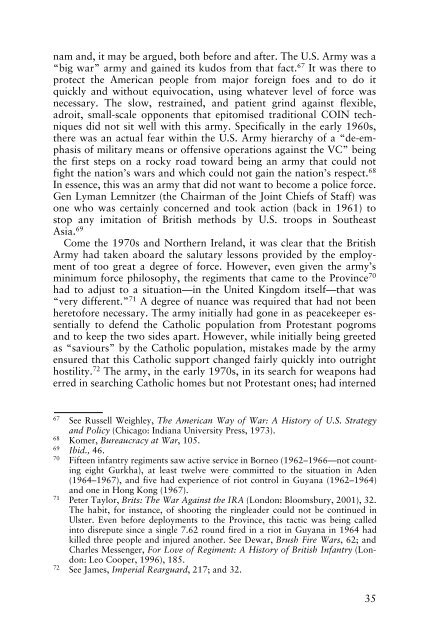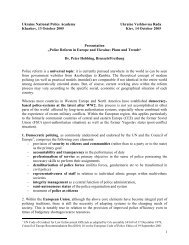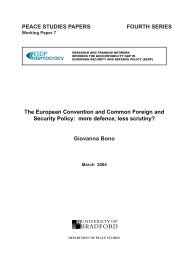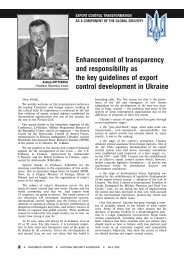combating terrorism and its implications for the security sector - DCAF
combating terrorism and its implications for the security sector - DCAF
combating terrorism and its implications for the security sector - DCAF
You also want an ePaper? Increase the reach of your titles
YUMPU automatically turns print PDFs into web optimized ePapers that Google loves.
nam <strong>and</strong>, it may be argued, both be<strong>for</strong>e <strong>and</strong> after. The U.S. Army was a<br />
“big war” army <strong>and</strong> gained <strong>its</strong> kudos from that fact. 67 It was <strong>the</strong>re to<br />
protect <strong>the</strong> American people from major <strong>for</strong>eign foes <strong>and</strong> to do it<br />
quickly <strong>and</strong> without equivocation, using whatever level of <strong>for</strong>ce was<br />
necessary. The slow, restrained, <strong>and</strong> patient grind against flexible,<br />
adroit, small-scale opponents that epitomised traditional COIN techniques<br />
did not sit well with this army. Specifically in <strong>the</strong> early 1960s,<br />
<strong>the</strong>re was an actual fear within <strong>the</strong> U.S. Army hierarchy of a “de-emphasis<br />
of military means or offensive operations against <strong>the</strong> VC” being<br />
<strong>the</strong> first steps on a rocky road toward being an army that could not<br />
fight <strong>the</strong> nation’s wars <strong>and</strong> which could not gain <strong>the</strong> nation’s respect. 68<br />
In essence, this was an army that did not want to become a police <strong>for</strong>ce.<br />
Gen Lyman Lemnitzer (<strong>the</strong> Chairman of <strong>the</strong> Joint Chiefs of Staff) was<br />
one who was certainly concerned <strong>and</strong> took action (back in 1961) to<br />
stop any imitation of British methods by U.S. troops in Sou<strong>the</strong>ast<br />
Asia. 69<br />
Come <strong>the</strong> 1970s <strong>and</strong> Nor<strong>the</strong>rn Irel<strong>and</strong>, it was clear that <strong>the</strong> British<br />
Army had taken aboard <strong>the</strong> salutary lessons provided by <strong>the</strong> employment<br />
of too great a degree of <strong>for</strong>ce. However, even given <strong>the</strong> army’s<br />
minimum <strong>for</strong>ce philosophy, <strong>the</strong> regiments that came to <strong>the</strong> Province 70<br />
had to adjust to a situation—in <strong>the</strong> United Kingdom <strong>its</strong>elf—that was<br />
“very different.” 71 A degree of nuance was required that had not been<br />
hereto<strong>for</strong>e necessary. The army initially had gone in as peacekeeper essentially<br />
to defend <strong>the</strong> Catholic population from Protestant pogroms<br />
<strong>and</strong> to keep <strong>the</strong> two sides apart. However, while initially being greeted<br />
as “saviours” by <strong>the</strong> Catholic population, mistakes made by <strong>the</strong> army<br />
ensured that this Catholic support changed fairly quickly into outright<br />
hostility. 72 The army, in <strong>the</strong> early 1970s, in <strong>its</strong> search <strong>for</strong> weapons had<br />
erred in searching Catholic homes but not Protestant ones; had interned<br />
67 See Russell Weighley, The American Way of War: A History of U.S. Strategy<br />
<strong>and</strong> Policy (Chicago: Indiana University Press, 1973).<br />
68 Komer, Bureaucracy at War, 105.<br />
69 Ibid., 46.<br />
70 Fifteen infantry regiments saw active service in Borneo (1962–1966—not counting<br />
eight Gurkha), at least twelve were committed to <strong>the</strong> situation in Aden<br />
(1964–1967), <strong>and</strong> five had experience of riot control in Guyana (1962–1964)<br />
<strong>and</strong> one in Hong Kong (1967).<br />
71 Peter Taylor, Br<strong>its</strong>: The War Against <strong>the</strong> IRA (London: Bloomsbury, 2001), 32.<br />
The habit, <strong>for</strong> instance, of shooting <strong>the</strong> ringleader could not be continued in<br />
Ulster. Even be<strong>for</strong>e deployments to <strong>the</strong> Province, this tactic was being called<br />
into disrepute since a single 7.62 round fired in a riot in Guyana in 1964 had<br />
killed three people <strong>and</strong> injured ano<strong>the</strong>r. See Dewar, Brush Fire Wars, 62; <strong>and</strong><br />
Charles Messenger, For Love of Regiment: A History of British Infantry (London:<br />
Leo Cooper, 1996), 185.<br />
72 See James, Imperial Rearguard, 217; <strong>and</strong> 32.<br />
35

















